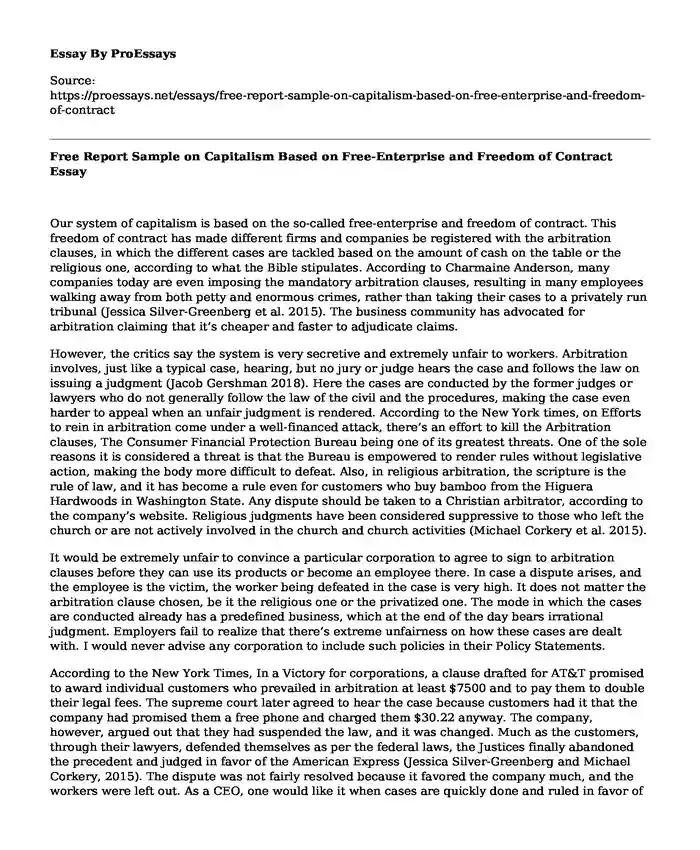Our system of capitalism is based on the so-called free-enterprise and freedom of contract. This freedom of contract has made different firms and companies be registered with the arbitration clauses, in which the different cases are tackled based on the amount of cash on the table or the religious one, according to what the Bible stipulates. According to Charmaine Anderson, many companies today are even imposing the mandatory arbitration clauses, resulting in many employees walking away from both petty and enormous crimes, rather than taking their cases to a privately run tribunal (Jessica Silver-Greenberg et al. 2015). The business community has advocated for arbitration claiming that it’s cheaper and faster to adjudicate claims.
However, the critics say the system is very secretive and extremely unfair to workers. Arbitration involves, just like a typical case, hearing, but no jury or judge hears the case and follows the law on issuing a judgment (Jacob Gershman 2018). Here the cases are conducted by the former judges or lawyers who do not generally follow the law of the civil and the procedures, making the case even harder to appeal when an unfair judgment is rendered. According to the New York times, on Efforts to rein in arbitration come under a well-financed attack, there’s an effort to kill the Arbitration clauses, The Consumer Financial Protection Bureau being one of its greatest threats. One of the sole reasons it is considered a threat is that the Bureau is empowered to render rules without legislative action, making the body more difficult to defeat. Also, in religious arbitration, the scripture is the rule of law, and it has become a rule even for customers who buy bamboo from the Higuera Hardwoods in Washington State. Any dispute should be taken to a Christian arbitrator, according to the company’s website. Religious judgments have been considered suppressive to those who left the church or are not actively involved in the church and church activities (Michael Corkery et al. 2015).
It would be extremely unfair to convince a particular corporation to agree to sign to arbitration clauses before they can use its products or become an employee there. In case a dispute arises, and the employee is the victim, the worker being defeated in the case is very high. It does not matter the arbitration clause chosen, be it the religious one or the privatized one. The mode in which the cases are conducted already has a predefined business, which at the end of the day bears irrational judgment. Employers fail to realize that there’s extreme unfairness on how these cases are dealt with. I would never advise any corporation to include such policies in their Policy Statements.
According to the New York Times, In a Victory for corporations, a clause drafted for AT&T promised to award individual customers who prevailed in arbitration at least $7500 and to pay them to double their legal fees. The supreme court later agreed to hear the case because customers had it that the company had promised them a free phone and charged them $30.22 anyway. The company, however, argued out that they had suspended the law, and it was changed. Much as the customers, through their lawyers, defended themselves as per the federal laws, the Justices finally abandoned the precedent and judged in favor of the American Express (Jessica Silver-Greenberg and Michael Corkery, 2015). The dispute was not fairly resolved because it favored the company much, and the workers were left out. As a CEO, one would like it when cases are quickly done and ruled in favor of the company to gain much from it. Still, on the other hand, the workers of that company should be the number one priority because they contribute heavily towards the success of the company. I would rather have the case heard in a court of law and justice be rendered.
References
Jacob Gershman, As More Companies Demand Arbitration Agreements, Sexual Harassment Claims Fizzle, Jan. 25, 2018 5:30 am ET
Jessica Silver-Greenberg and Michael Corkery, Efforts to Rein In Arbitration Come Under Well-Financed Attack, Nov. 15, 2015
Jessica Silver-Greenberg and Robert Gebeloff, Arbitration Everywhere, Stacking the Deck of Justice, Oct. 31, 2015.
Michael Corkery and Jessica Silver-Greenberg, In Religious Arbitration, Scripture Is the Rule of Law, Nov. 2, 2015
Cite this page
Free Report Sample on Capitalism Based on Free-Enterprise and Freedom of Contract. (2023, Dec 16). Retrieved from https://proessays.net/essays/free-report-sample-on-capitalism-based-on-free-enterprise-and-freedom-of-contract
If you are the original author of this essay and no longer wish to have it published on the ProEssays website, please click below to request its removal:
- Determining the Price of Diamonds: Supply and Demand Analysis
- Case Study on the Matter of Deontological and Teleological Frameworks to International Business
- The Imperial Hotel-London Case Study
- Teachers Pay Essay Example
- Rich-Poor Gap Widening: Working Class Struggling To Make Ends Meet - Research Paper
- Essay Example on Americans Paying More for Healthcare: Unsustainable Costs and Limited Knowledge
- Business Plan - Free Sample







